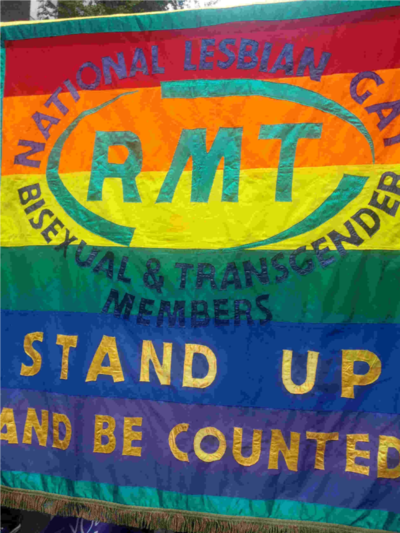Similar topics:
Attached documents
RMT LGBT CONFERENCE, 9th - 10TH MAY 2014 BRISTOL
This conference synopsis is taken from a report by Joanne Parry
RMT LGBT Conference 2014 was opened by the Bristol branch secretary who said Bristol was well known for diversity and inclusion. There was then an address from Mick Cash, Acting General Secretary.
AGS Mick Cash said he hadn't expected to be doing this and gave a tribute to Bob Crow. Bob left such a great gap but also a great legacy. Mick explained that In 2002 when Bob and Mick were elected, the equality conferences didn't exist. Mick spoke about many subjects and took questions. Among the topics he covered were that we should continue to ensure that rack and file members keep determining the path of the union. Mick talked briefly about a “Structure of the Union” consultation document being considered by the EC. We are very good industrially and need to ensure equality is at heart of what we do and integrate it into our industrial matters. We are a campaigning union and we should build on this work.
LGBT advisory committee report
Roger Hackett, conference chair said that some excellent hard work done by the committee this year. We need to work on organising across the regions. The RMT have held demonstrations outside several embassies of countries where LGBT people are discriminated against, and that these have been amazing work and we need to carry this on. Roger also explained what being an advisory committee member entails.
 EC member Nick Quirk gave a report on the progress of motions from the previous LGBT conference. Nick will be asking the GS to write to the International Transport Federation to push for LGBT support in response to a letter from the ITF saying they would not set up an LGBT group. Nick reported some positive news from Network Rail. TOCs are finally waking up and realising the importance of equality reps. Nick stated that members need to go back to branches and ensure that everyone knows the importance of equality.
EC member Nick Quirk gave a report on the progress of motions from the previous LGBT conference. Nick will be asking the GS to write to the International Transport Federation to push for LGBT support in response to a letter from the ITF saying they would not set up an LGBT group. Nick reported some positive news from Network Rail. TOCs are finally waking up and realising the importance of equality reps. Nick stated that members need to go back to branches and ensure that everyone knows the importance of equality.
The next talk was by Maria Exall who is TUC LGBT Committee Chair. Maria explained what the TUC LGBT committee do. They Have a conference and take up LGBT issues on the committee that cross the industrial sectors. Homophobia and transphobia in school is campaigning work for all unions as a whole not just educational sector. Maria said that some of our union representatives are involved in LGBT staff networks but that there are stark differences on some issues. We need a strong stance on equality as we need to show the union is fighting for all in the workplace. Maria said she was disgusted that the current government is using LGBT issues to cover the agenda of liberal policies explaining the stark change as David Cameron voted against LGBT rights until he got into office.
Maria welcomed legal equality but that this is not everything giving the example that women got equality in 1976 but there is still a huge pay gap. Maria told the conference that some of the things the TUC LGBT committee have worked on include education, sport, religion, international rights and consultation on civil partnerships – retain and extend them to heterosexual relationships. Maria added that the TUC approached the Football Association about homophobia in sport but the response was very negative.
Maria said that the TUC brokered London pride to include community groups and that TUC provides funding to the London Pride. Maria asked can we politicise Pride better?
A speaker from Thompson's solicitors - Bruce Robin gave a talk covering many aspects of employment law. He said there was an 80% drop off in tribunal claims since the introduction of tribunal fees! A whole host of other employment law changes occurred too in the last year. In April 2013 major changes came into effect - a reduction of collective consultation periods for 100 workers or more was 90 days reduced to 45 days. Tribunal fees since July 2013. Widely covered in the media. Categories A and B which are an issue fee and a hearing fee. Unfair dismissal case is now £1250 to get it heard. Not many people will have this sort of money to bring this case if you have just lost your job.
Bruce’s speech also covered subjects including TUPE, redundancies, and many other areas of interest; and explained how Con Dem changes to employment law have made it much harder for people to access justice due to costs and increased hurdles.
 Alan Pottage from the RMT Organising Unit spoke about how membership had risen massively since 2002. Then we only had 55,000 members. Bob Crow organised a strategy which proved to be the most successful in Europe to expand membership. However, Alan said, the strategy only works because you the workers are out there recruiting. Are there any barriers that are stopping you from getting involved and getting active? If there are then we need to know so we can help you to get there.
Alan Pottage from the RMT Organising Unit spoke about how membership had risen massively since 2002. Then we only had 55,000 members. Bob Crow organised a strategy which proved to be the most successful in Europe to expand membership. However, Alan said, the strategy only works because you the workers are out there recruiting. Are there any barriers that are stopping you from getting involved and getting active? If there are then we need to know so we can help you to get there.
Jess Webb, conference Secretary also spoke about the RMT education department. Jess said need to think about what we provide education-wise and that she had requested that all the advisory groups have a weekend of empowerment. How to... write resolutions, understand the structures, etc. Also discuss any issues they are experiencing. Last week I got data of members who have indicated sexuality and transgender on the membership forms and half of those have indicated they are happy to be contacted. Also the committee have in-putted into the equality syllabus.
Resolutions
There were 4 resolutions, all of which were passed at the conference. The Unions executive will discuss all of these, but two will be sent to the RMT annual general meeting. The motions - which are at the bottom of this article in full were:
i) Affiliation: Rainbow International LGBT Activist Solidarity Fund
ii) Homophobic counsellors
iii) International Lesbian, Gay, Bisexual, Trans and Intersex Association
iv) RMT LGBT Representation
It was decided that the first and last will go before the AGM.
 Cheryl Morgan a local speaker gave a very interesting talk on trans issues. Cheryl is Co-chair of Out Stories Bristol which collects and preserves stories of LGBT history in Bristol. Cheryl explained that Trans people essentially don’t fit into the traditional views of gender. Gender Presentation – what you wear, how you behave etc Gender Identity – who you are, often manifests at a very early age. Cheryl said that Trans is NOT... a mental illness. It is still listed as such by DSM-5 as such, mainly because a diagnosis of some sort is needed for people to access treatment. Over 90% of patients show improvement, negative results may be a result of social issues rather than the treatment. Trans is NOT... a sexuality. Gender identity and sexuality are different. Many Trans people identify as G or L post-transition. Kids who identify as Trans at age 5 are not thinking about who they want to sleep with. What do Trans people want – the same rights and respect as everyone else in society. there was a long discussion from the floor following Cheryl’s talk, with delegates asking questions and discussing their own experiences of trans issues and transphobia.
Cheryl Morgan a local speaker gave a very interesting talk on trans issues. Cheryl is Co-chair of Out Stories Bristol which collects and preserves stories of LGBT history in Bristol. Cheryl explained that Trans people essentially don’t fit into the traditional views of gender. Gender Presentation – what you wear, how you behave etc Gender Identity – who you are, often manifests at a very early age. Cheryl said that Trans is NOT... a mental illness. It is still listed as such by DSM-5 as such, mainly because a diagnosis of some sort is needed for people to access treatment. Over 90% of patients show improvement, negative results may be a result of social issues rather than the treatment. Trans is NOT... a sexuality. Gender identity and sexuality are different. Many Trans people identify as G or L post-transition. Kids who identify as Trans at age 5 are not thinking about who they want to sleep with. What do Trans people want – the same rights and respect as everyone else in society. there was a long discussion from the floor following Cheryl’s talk, with delegates asking questions and discussing their own experiences of trans issues and transphobia.
As the conference drew to a close, elections were held for chair and vice chair positions next year, and Brighton was named the next venue. There was also a discussion on upcoming LGBT and Trans pride events coming up, with advisory committee members committing to organise events local to them.
- 5608 reads






